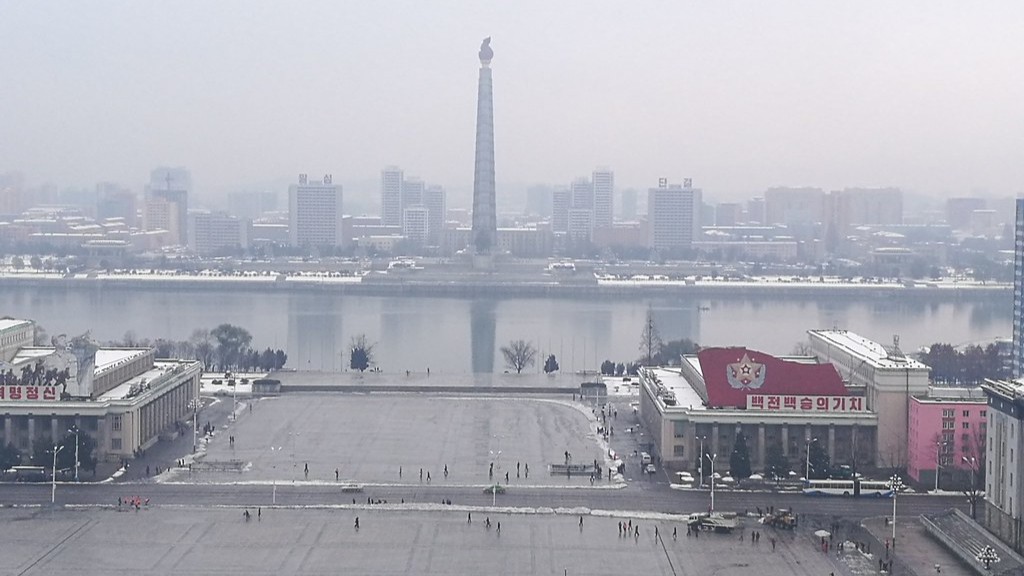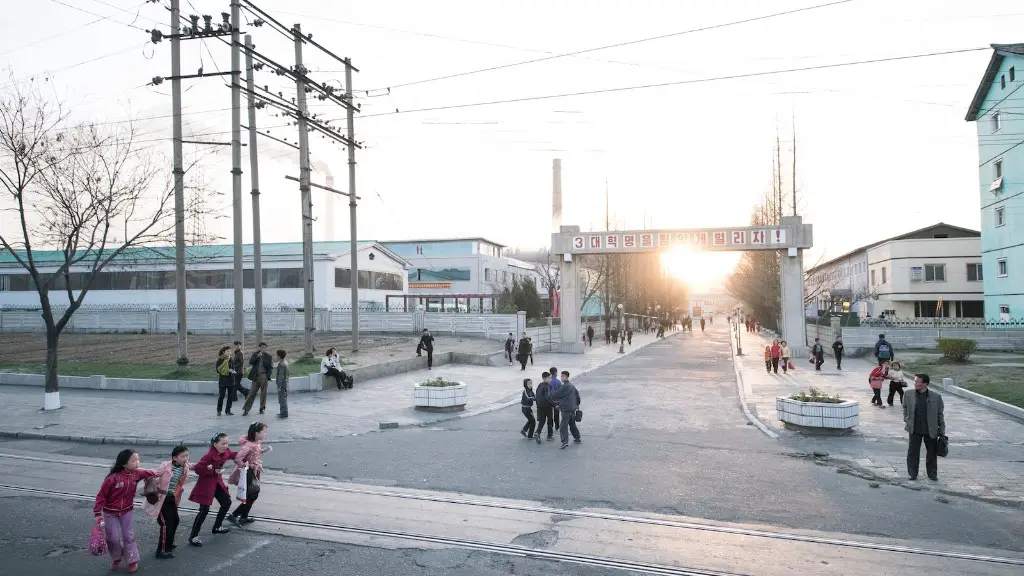North Korea has long been a thorn in the side of the United States. The Kim regime has consistently disregarded international law and been heavily criticized for its totalitarian rule, human rights abuses and nuclear proliferation. But what has North Korea done specifically to the United States?
In the past few decades, North Korea has made continual attempts to expand its missile and weapons testing. In 2017, the crisis reached its apex. The North Koreans launched multiple intercontinental ballistic missiles and detonated their sixth nuclear weapon. This presented an unprecedented threat to U.S. security, but it was not their only act of aggression aimed at American interests.
There have also been numerous cyber-attacks claiming to be from North Korea. In 2014, North Korea was accused of the massive Sony hack in retaliation for the movie “The Interview.” North Korea is also accused of being connected to the WannaCry ransomware attack of 2017, which cost millions of dollars in damage to businesses worldwide. This attack was described by one cybersecurity expert as “groundbreaking” in its sophistication. North Korea also reportedly hacked the U.S. government’s systems, targeting military war plans and intelligence.
North Korea’s behavior has been described as hostile, provocative and dangerous by U.S. and international leaders. The United Nations Security Council has levied multiple sanctions against North Korea in the hopes of curbing the regime’s behavior, but these have had little effect. The U.S. has maintained a policy of “strategic patience” with North Korea, but this has not helped to improve relations.
The U.S. and North Korea have long been at odds, and the Kim regime views the U.S. as a threat to its security. In the past, Kim Jong-un has declared that the U.S. “will never be pardoned” for the past policies of the Bush and Obama administrations. He has also made incendiary statements about launching a first strike against the U.S. and its allies, putting the region on edge.
The recent efforts at peace between North Korea and the U.S. have been heralded as a step in the right direction. The potential denuclearization of North Korea and the opening up of diplomatic channels are seen as positive developments, but there is still much that needs to be done in order to achieve true peace and stability. With the many threats posed by North Korea, the U.S. must remain vigilant and take proactive steps to ensure its security.
Impact of Nuclear Proliferation
Nuclear proliferation has been a major concern with regard to North Korea’s actions. The U.N. has cautiously promoted the idea of denuclearization, but this process could take many years to complete. In the meantime, the threat of a nuclear attack could pose a grave danger to the US and its allies, as North Korea has demonstrated the capability to deliver a nuclear-tipped missile to any location. The US and its allies must be prepared for any eventuality.
The potential for a nuclear-armed North Korea to spark a regional arms race has been a major concern for the past two decades. South Korea and Japan, among others, would likely seek to obtain nuclear weapons as a deterrent, creating an even more unstable situation in the region. North Korea, for its part, has declared itself a nuclear power, reinforcing its stance that its nuclear program is for defensive rather than offensive purposes.
The implications of a nuclear-armed North Korea are far-reaching. The international community has attempted to impose sanctions to limit North Korea’s ability to obtain materials necessary for its weapons program, but these efforts have largely proven ineffective. U.S. intelligence believes that North Korea has developed the technology to miniaturize a nuclear warhead, making it a dangerous and unpredictable threat on the world stage.
The issue of proliferation has also become increasingly important with North Korea’s recent efforts to improve diplomatic relations with the U.S. The landmark summit between President Trump and Kim Jong-un in 2018 has led to increased optimism that a denuclearization deal could be reached, but there are still many questions surrounding the logistics of this agreement.
Human Rights Abuses
A serious and ongoing concern with North Korea are the numerous allegations of human rights abuses. The United Nations have accused the Kim regime of torture, summary executions, arbitrary detention, restrictive labor laws, and other egregious violations. Reports of public executions, chemical and biological weapons tests on inmates, and political prisoners kept in inhumane conditions are commonplace and widely documented by international bodies.
The North Korean government has also been accused of tracking down, imprisoning, and killing North Koreans attempting to escape the country. Those caught attempting to flee could face severe punishments, such as forced labor in prison camps or execution. North Korea’s government strictly controls all aspects of life in the country, and few are able to voice dissent or criticize the regime.
The international community has put pressure on North Korea to improve its human rights record, but the regime continues to ignore calls for reform. Many observers point to the government’s reliance on propaganda and cult-like veneration of the Kim family as being partly responsible for its repressive policies.
The U.S. has criticized North Korea’s human rights abuses in the past and has sought to impose sanctions on Kim Jong-un and other top officials. Despite these efforts, however, significant progress has yet to be made in this area. Until North Korea takes meaningful steps towards ending its human rights violations, the U.S. must remain firm in its stance and continue to pressure the regime to change.
Relationship with China
The relationship between North Korea and China is often viewed as one of the main sources of stability in the region. China has long been a major ally of North Korea, providing it with military and economic support. China is also North Korea’s largest trading partner and has been a major player in the recent peace talks between North Korea and the US.
China has been criticized for enabling North Korea’s bad behavior, however. International experts point to China’s continued support for the Kim regime as having a major impact on the North Koreans’ ability to pursue their nuclear ambitions. In recent years, China has also been accused of turning a blind eye to North Korea’s human rights abuses and providing it with financial and military assistance despite international sanctions.
The U.S. has sought to work with China to pressure North Korea to end its nuclear program, but it has found little success. China is wary of U.S. interference in the region and has become increasingly concerned with U.S. military presence in the area. Despite their differences, both the U.S. and China have a vested interest in maintaining peace in the region, and this has driven them to take a cooperative stance in recent negotiations.
The relationship between North Korea and China remains an important issue for regional stability. Though the two countries have become more open to cooperation and dialogue, much must be done to ensure that the two countries continue to work together and put an end to North Korea’s nuclear program.
International Reactions
The international community has had a strong reaction to North Korea’s actions by imposing a series of U.N. sanctions, collective actions from the U.S. and its allies and resolutions condemning North Korean aggression. While the U.N. resolutions have had some effect in slowing the development of North Korean weapons, they seem to have had little effect in changing the behavior of the regime.
The sanctions and collective actions have also proven ineffective in curbing North Korea’s nuclear ambitions, as the country continues to develop weapons despite the economic pressure. Additionally, North Korea has continued to engage in inflammatory rhetoric and provocations, leading to growing tensions between the U.S. and North Korea.
The U.S. has also sought to isolate North Korea in the international community by cutting off diplomatic ties and limiting its access to global markets. This has had some success in puting pressure on the regime, but it has also led to increased instability in the region. North Korea has also responded by increasing its own isolation, making it difficult to reach a peaceful resolution.
The international community is uncertain as to what the future holds for North Korea. The country has long been a source of contention and tension, and its behavior continues to pose a threat to global security. The U.S. and its allies have called for an end to North Korea’s weapons development, but the regime has shown no signs of heeding these warnings. For now, the international community must remain vigilant and hope for a peaceful resolution that can bring security and stability to the region.
The Impact on the US
The US has long been concerned with North Korea’s aggression, and the US has imposed sanctions and other measures in an attempt to deter North Korea from further aggression. Yet, North Korea has continued to develop its weapons programs, making the US and its allies increasingly nervous. The US also fears that North Korea may be selling its nuclear technology to other countries or non-state actors, making the threat even more pressing.
The US has also been concerned with North Korea’s cyber-attacks, particularly the attack against Sony in 2014 and the WannaCry ransomware attack in 2017. These attacks have resulted in the loss of millions of dollars, and they have shown the world that North Korea is a highly capable and competent cyber power. This has led to greater fears that North Korea and other rogue states may be deploying cyber-attacks in the future.
The US has also had to contend with North Korea’s bellicose rhetoric, including threats of nuclear attacks and declarations of war. This has led to increased tensions and the US has had to take measures to protect its citizens and allies from potential attacks. The US has also sought to diplomatically engage with North Korea in an attempt to de-escalate tensions and work towards a peaceful resolution.
Overall, North Korea has presented a threat to the US and its allies for decades, and this threat has been escalated in recent years. The US and its allies must continue to remain vigilant and take proactive steps to ensure the safety and security of their citizens. Given the continued threats posed by North Korea, the US must remain focused on the task of maintaining peace and stability in the region.





